

10 mixed questions

10 questions to test your knowledge

10 mixed trivia questions

Are you up for a quiz?
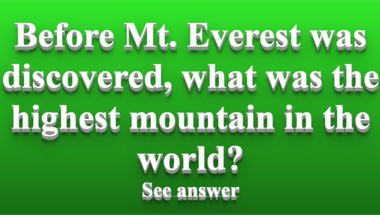
10 questions for you
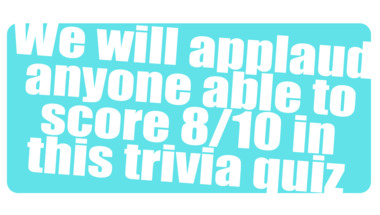
10 mixed questions

Can you get more than half of them right?

10 mixed questions

10 mixed questions

10 fun questions

10 mixed questions

10 easy to hard questions

* 10 mixed general questions *

Forward quiz if you score 4 or more

10 Quite Difficult Questions

10 mixed questions

How nerdy are you?

10 questions to test your knowledge
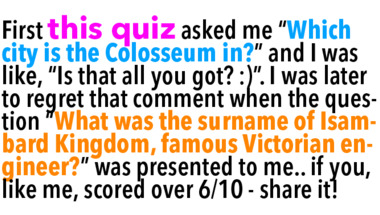
Quiz Time

10 fun questions

This quiz is hard people!

10 questions to test your knowledge

10 questions with a variety of topics

10 songs to guess
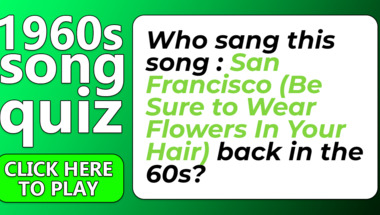
Please tell me your score in the comments

How many correct will you get?

10 mixed questions
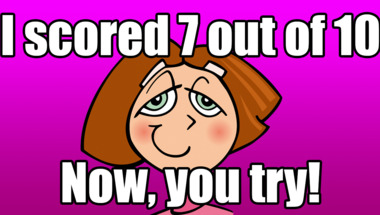
Will you get history right?

Scoring a clean 10 will never happen

10

10 questions

Please tell me your score in the comments

10 trivia questions about movies

10 fun questions
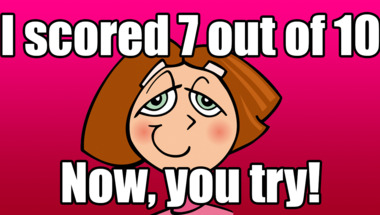
So hard that 5 out of 10 right is considered ..

Here are 10 engaging trivia questions for you..

What do you remember?

10 questions

Will you even get 5 questions right?

10 mixed questions

Let us know your score in the comments

Can you help us find the missing words?

How high will you score?

10 difficult questions

We mixed up 10 good questions here

Did you live in the 1960s?

What do you remember?
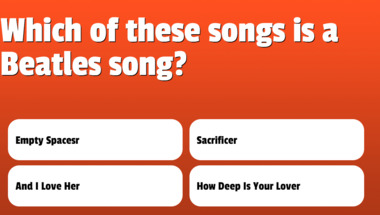
10 questions lined up

10 questions to test your knowledge

Is your IQ high enough for these questions?

10 hot questions
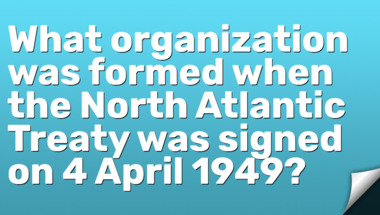
How many correct answers will you get?

10 questions to test your knowledge

10 mixed questions
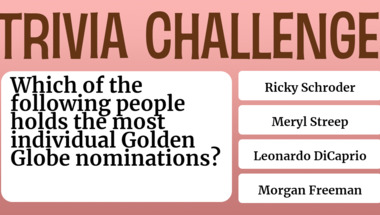
10 songs to guess

Try out this fun quick quiz

Let's see how smart you really are!

10 Hard Questions

10 questions

10 Genius Questions

Did you pay attention in school?

Can you tell us who sang these 10 songs from ..

10 mixed questions

How many of these songs do you remember the l..

10 questions to answer

Let us know your score in the comment section

10 mixed up questions in a range of categorie..

Let's see how smart you really are!

We have 10 questions for you here

10 questions to test your knowledge

How high can you score?

How many correct will you get?

Very difficult mixed music questions

10 questions

10 mixed up questions
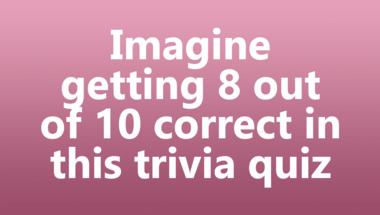
10 mixed questions

Can you score 5 or higher?

10 questions to test your knowledge

10 quite hard questions

10 mixed songs to guess

What do you remember?
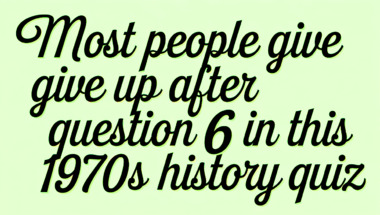
How many correct answers will you get?

Let's see how smart you really are!
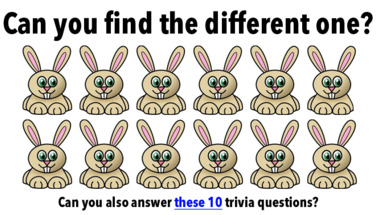
10 questions

10 Mixed Trivia Questions

What do you know?

10 questions

10 mixed questions

Click here to have fun

Where have you been?

Can you answer 7/10 of these questions?

Can you name the artists?

Can you answer 7/10 of these questions?

Can you score 8/10?

Let's see how smart you really are!

How many songs can you guess?

10 questions to test your knowledge

How many correct will you get?

How smart are you really?

by clicking here

10 questions to test your knowledge

A questionnaire comprising of 10 inquiries.

10 interesting questions

Test your intelligence with this challenging ..

Here are 10 enjoyable inquiries.

10 quite impossible questions

10 mixed questions

We tell you the stars, you tell us the movie!

10 fun questions

How high will you score?

10 questions to test your knowledge

How many correct answers will you get?

Are you up for a quiz?
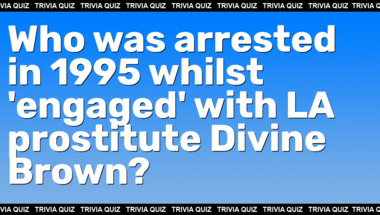
10 mixed trivia questions

Please provide a revised version of this sent..

10 questions

We mixed up 10 good questions here

10 questions about food

10 questions covering various topics
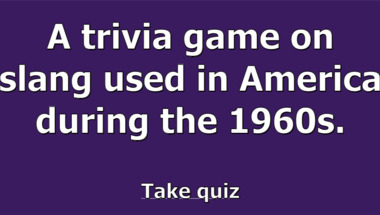
Let us know your score

The 1960s was a golden era for popular music, with each year producing hit after hit across a variety of genres. From rock and roll to Motown, and from country to pop, the decade’s soundscape was as vibrant as its culture. Let’s delve into a set of ten classic trivia questions about some of the most memorable songs from the 60s. We’ll explore not only who sang them, but also the stories behind each track and its lasting influence.
1. Who sang this song: Yellow Submarine back in the 60s?
Yellow Submarine is one of the most whimsical and recognizable songs from the 1960s, and it was performed by none other than The Beatles. Released in 1966 on the album Revolver and also as a single, Yellow Submarine became an anthem of sorts for both children and adults. The song was primarily sung by Ringo Starr, the Beatles’ drummer, whose distinct voice brought a playful charm to the track.
The Beatles were already cultural icons by the time Yellow Submarine came out, and the song’s playful lyrics and catchy chorus made it instantly popular. The song's success led to an animated film of the same name, further embedding the phrase Yellow Submarine into popular culture. The Beatles’ ability to cross generational and genre boundaries is clearly evident in songs like this, proving their versatility.
2. Who sang this song: Good Vibrations back in the 60s?
Good Vibrations is credited to The Beach Boys, specifically released in 1966. This song is often hailed as a masterpiece of pop innovation, due to its complex structure and groundbreaking use of the theremin, an electronic instrument. Brian Wilson, the band’s creative leader, spent months perfecting the track, which eventually became a chart-topping hit.
The Beach Boys were synonymous with the surf rock sound of the early 60s, but Good Vibrations marked their evolution into more experimental territory. The song’s layered harmonies, intricate production, and uplifting lyrics made it a standout, and it’s frequently cited as one of the greatest singles of all time. The phrase “good vibrations” remains associated with positive feelings and the sunny California lifestyle the Beach Boys embodied.
3. Who sang this song: Stop! In The Name Of Love back in the 60s?
The iconic girl group The Supremes brought Stop! In The Name Of Love to life in 1965. The Supremes, led by Diana Ross, were one of Motown’s biggest acts, and their polished performances, catchy songs, and glamorous style made them international superstars. This particular track is known for its unforgettable chorus and the signature hand gesture the group performed during live shows.
Stop! In The Name Of Love was written and produced by the legendary team of Holland-Dozier-Holland. The song became a number one hit on the Billboard Hot 100 and remains an enduring symbol of 60s Motown. The Supremes' success paved the way for countless other girl groups and demonstrated the power of female performers in pop music.
4. Who sang this song: Think back in the 60s?
The powerhouse vocalist Aretha Franklin is behind the unforgettable hit Think, released in 1968. Known as the Queen of Soul, Aretha Franklin brought energy, emotion, and a demand for respect to every performance. Think is both a danceable anthem and a song with a message, encouraging listeners to consider their actions and fight for freedom.
Aretha’s version of Think became an instant classic, and her performance in the movie The Blues Brothers in 1980 introduced the song to new generations. The song’s punchy horns, driving rhythm, and Franklin’s powerful vocals make it a staple of soul music and a testament to her enduring influence.
5. Who sang this song: Everybody Loves Me But You back in the 60s?
This heart-tugging ballad was performed by Brenda Lee. Released in 1962, Everybody Loves Me But You showcases Lee’s unique ability to blend country and pop influences. Brenda Lee, sometimes known as Little Miss Dynamite due to her petite stature and big voice, was a major star during the early 60s.
Her emotional delivery and relatable lyrics made this song a favorite among teenagers dealing with the trials of young love. Brenda Lee’s career spanned many decades, but her early-60s hits like this one cemented her place in pop history.
6. Who sang this song: Harper Valley P.T.A. back in the 60s?
The witty and narrative-driven Harper Valley P.T.A. was sung by Jeannie C. Riley. Released in 1968, the song tells the story of a single mother standing up to the local parent-teacher association’s hypocrisy. Its catchy tune and clever lyrics quickly turned it into a crossover hit, topping both the country and pop charts.
Harper Valley P.T.A. remains a classic example of country storytelling, and Jeannie C. Riley’s spirited performance gave the song its edge. The song inspired a movie and a television series, reflecting its broad appeal and cultural resonance.
7. Who sang this song: Born Free back in the 60s?
Born Free is most closely associated with Matt Monro, whose smooth vocals brought the song to life in 1966. The song served as the theme for the movie of the same name, about an orphaned lion cub in Africa, and quickly became an inspirational anthem.
Matt Monro, often called The Man with the Golden Voice, was a British singer with a string of hits in the 60s. Born Free won the Academy Award for Best Original Song and remains a popular standard, symbolizing hope and the beauty of nature.
8. Who sang this song: Lonely Weekends back in the 60s?
The song Lonely Weekends is a notable hit by Charlie Rich. Released in 1960, it was one of Rich’s first successes and showcased his unique blend of rockabilly, soul, and country influences. Charlie Rich would go on to have many more hits in the 70s, but Lonely Weekends remains a classic of the early 60s era.
The track’s upbeat tempo belies its melancholy lyrics, a contrast that made it appealing to a broad audience. Charlie Rich’s smooth vocals and piano skills set him apart from many of his contemporaries.
9. Who sang this song: Two Faces Have I back in the 60s?
Two Faces Have I was a hit for Lou Christie in 1963. Known for his falsetto voice and dramatic delivery, Lou Christie brought a unique flair to the pop charts of the era. The song is a tale of romantic conflict, with Christie’s soaring vocals expressing the emotional highs and lows of young love.
Lou Christie’s influence can still be heard in modern pop music, particularly in artists who use falsetto as a key part of their vocal style. Two Faces Have I remains one of his signature songs.
10. Who sang this song: Let It Be Me back in the 60s?
This timeless ballad was beautifully rendered by The Everly Brothers in 1960. Let It Be Me was originally a French song (Je t’appartiens) but became a major hit in the English-speaking world thanks to the Everly Brothers’ harmonious vocals and heartfelt delivery.
The song’s gentle melody and romantic lyrics have made it a perennial favorite for weddings and special occasions. The Everly Brothers’ influence on the development of close harmony singing in pop and rock cannot be overstated, and Let It Be Me stands as a testament to their musical legacy.
Conclusion
These ten songs represent just a small slice of the 1960s’ musical landscape, but each one tells a story of its own. From the British Invasion to Motown, country crossovers to pop ballads, the decade’s diversity is on full display. Whether you’re a lifelong fan or just discovering these classics, the 60s continue to inspire and entertain listeners worldwide.